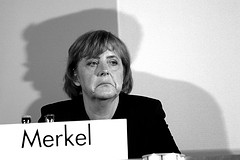Will Merkel yield to Tsipras’s demands?
 Angela Merkel via Flickr
Angela Merkel via Flickr
On January 25, 2015, Alexis Tsipras lead the left-wing Syriza party to a sweeping victory in Greece’s general election, only missing 2 seats from forming a majority government.[1] The new Prime Minister has promised to “give the Greeks back their dignity” by abandoning austerity and seeking mutually beneficial solutions with their creditors to address their 175% debt issue. [2] Though this may be appealing to the Greeks who to this day can feel the consequences of the 2008 global financial crisis and see foreign-loans as the cause of their misfortunes, its creditors have mixed feelings about the implications of Tsipras’s policies on Europe.[3]

So what exactly does Syriza mean by mutually beneficial solutions? The Syriza party has sworn to fix the 25% unemployment and a 50% youth unemployment, and relieve the Greeks with a plan that will approximately cost €11.3billion.[4] The question is who and how will Tsipras fund his promises when it carries a colossal debt and is bounded by the Troika’s (European Commission, European Central Bank and the International Monetary Fund) demands to cut spending. Tsipras has explicitly demanded the Troika to write off Greece’s debt in a conference that mirrored the London Debt Conference of 1953 where Germany’s post-War debt sharply decreased to allow it to breath. Moreover, he wants Germany to repay a loan from the Nazi occupation of Greece that is worth €11 billion today.[5] The mere fact he recently honoured the 200 communist that were imprisoned in the Haidari concentration camp under Nazi occupation in Greece signalled a symbolic resistance to Germany’s physical and economic oppression of the past and present.[6] Essentially, Tsipras have morphed Angela Merkel into a pro-austerity dominatrix who is keeping Greece from growth.[7]
Though his campaign has created a great amount of hype in Europe, it is unlikely Merkel will give in to a debt write-off that could cost the EU and Germany €62 billion (the bill of the Greece loan). If Germany’s economy shrinks by 5%, this could translate to hundreds of thousands of Germans loosing their job and causing internal political unrest. Furthermore, Merkel has witnessed the positive impact of austerities for Ireland, Portugal and Spain, and perhaps it will too with Greece given enough time.[8] These rehabilitating countries expressed that Tsipras should not be granted an exception just because “he screams the loudest.”[9] Second, some would rather have the “weakest link” be eliminated from the Eurozone than having to undermine austerity and reform policies.[10] In fact Merkel and her Finance Minister Wolfgang Schäuble have confidence the euro can survive Greek exit without serious upheaval.[11] The German government has shown little anxiety over the matter while the world media have fictionalized Tsipras as the saviour of Greece and put the microscope on Merkel to reach a conclusion.[12] Even if Greece does exit the EU, there are other countries that seek to become members of the EU. For example, when Lithuania was accepted the beginning of the year, Lithuanians took onto the streets to celebrate its membership in the EU. In essence, EU would still remain as legitimate if not more than before if Greece exits. This would illustrate the “chain theory” where the elimination of weakest out of the chain of countries would strengthen the entire system. [13]
In contrast, there are many officials who subscribe to the “domino theory” that paints a grimmer outlook for the EU and Merkel.[14] Tsipras claims, “ if the euro fails, then Europe will fail as well.[15]” It is possible that countries that have not welcomed austerity with open arms in the past might welcome anti-austerity policies modelled after the “success” of the Greek government. Therefore, this could be an obstacle for Merkel’s ultimate aim of stability and maintaining the current balance of power in Europe. This path towards the EU breakup was seen unravelling when Greek Finance Minister Gianis Varousfakis, affirmed on Friday, that Athens would no longer with the Troika.[16] Subscribers of this theory believe that Greece has a major bargaining position. First, according to the domino, Greece’s departure can sink European economy into chaos and plummet the Euro, much like the Lehman Brothers in 2008. Second, Greece is a political ally and a NATO member; she is needed to strengthen EU sanctions and policies against Russia for her illegal activities in the Ukraine.[17] Merkel does not want to add on top of the Ukraine Crisis a politically ambiguous Greece.
Though it is valid to assume that Tsipras will start looking away from the EU for support as he met with the Russian envoy and opposed to Russian sanctions, one must take note that Greece has always had good relations with Russia because they are major commercial partners.[18] Despite the fact that media have portrayed Greece of playing the Russian card and reneging its obligations to the EU and NATO, it is unlikely that this will ever become a reality.[19] First, a Russian loan would be too small to help Greece at all; Greek debt is almost equal to Russia’s entire foreign reserves.[20] Second, history has repeatedly demonstrated every time Greece turns to Russia for assistance, it resulted only in disappointment and catastrophe.[21] In fact, the EU and the West have to bail Greece out three times.
At this point, it is difficult to pinpoint exactly the direction that the Syriza party is heading. If Merkel gives into Tsipras’s demands, it can undermine the power of austerity and the EU. Moreover, it can upset the status quo of European politics. With populist parties on the rise in Europe, giving in to the Syriza can strengthen and inspire extremist groups. On the other hand, if Tsipras does not deliver what he promised to the Greeks by getting a mere extension of the debt repayment, this would be humiliating and the Syriza party would most likely be ousted in the next elections. Both sides are essentially playing the game of chicken and waiting for the each other to swerve first. It is most likely that it will continue to be this way until February 28th when the EU aid program expires. While Merkel has insisted that she does not want the situation to escalate too far, Tsipras was elected to promote radical changes in Greece and Europe; they represent the polar ends of European politics. Likewise, a compromise won’t be reached until they drive each other to the brink.
____________________________
References:
[1] Murray, Don. “Alexis Tsipras’s Win in Greece a Major Test for Eurozone.” CBC NEWS, January 26, 2015. Accessed January 27, 2015. http://www.cbc.ca/news/business/alexis-tsipras-s-win-in-greece-a-major-test-for-eurozone-don-murray-1.2931478.
[2] Blome, Nikolaus et al. “Merkel’s Unintended Creation: Could Tsipras’ Win Upset Balance of Power in Europe?” Spiegel International, January 31, 2015. Accessed January 31, 2015. http://www.spiegel.de/international/europe/greek-election-makes-euro-zone-exit-real-possibility-a-1015907.html.
[3] “Greece Will Not Default – PM Tsipras.” BBC News. January 28, 2015. Accessed February 3, 2015. http://www.bbc.com/news/world-europe-31016261.
[4] “Five Things Syriza Wants for Greece.” BBC News. January 28, 2015. Accessed February 3, 2015. http://www.bbc.com/news/world-europe-31003070.
[5] Ibid.
[6] Blome. “Merkel’s Unintended Creation.”
[7] Ibid.
[8] Ibid.
[9] Ibid.
[10] Blome, Nikolaus et al. “Grexit Grumblings: Germany Open to Possible Greek Euro Zone Exit – SPIEGEL ONLINE.” SPIEGEL ONLINE. January 5, 2015. Accessed February 3, 2015. http://www.spiegel.de/international/europe/merkel-and-germany-open-to-possible-greek-euro-zone-exit-a-1011277.html.
[11] Blome et al. “Merkel’s Unintended Creation.”
[12] Ibid.
[13] Blome et al. “”Grexit Grumblings.”
[14] Ibid.
[15] Blome. “Merkel’s Unintended Creation.”
[16] Ibid.
[17] Von Hammerstein, Konstantin et al. “An Unexpected U-Turn: Why Merkel Wants To Keep Greece in Euro Zone – SPIEGEL ONLINE.” SPIEGEL ONLINE. September 10, 2010. Accessed February 3, 2015. http://www.spiegel.de/international/europe/merkel-wants-to-keep-greece-in-the-euro-zone-a-854879.html.
[18] “Five Things Syriza Wants for Greece.”
[19] Schmieding, Holger,” Greece Eyeing Russia Card? | The Japan Times.” Japan Times RSS. February 2, 2015. Accessed February 3, 2015. http://www.japantimes.co.jp/opinion/2015/02/02/commentary/world-commentary/greece-eyeing-russia-card/#.VNBf_l54rLc.
[20] “The Reference Frame.” The Reference Frame. January 30, 2015. Accessed February 3, 2015. http://motls.blogspot.ca/2015/01/will-russia-bailout-greece.html.
[21] Anastassiadis, Tassos and Sven-Oliver Proksch. “Analyzing Greece: Understanding the Future of the European Union After the Greek Elections.” Lecture, Round Table from HSA Mcgill, Montreal, February 2, 2015.
